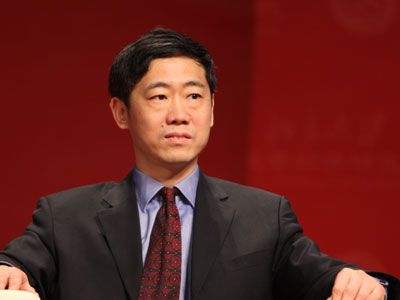Facing economic challenges requires hard look at reform
- By Li Daokui
 0 Comment(s)
0 Comment(s) Print
Print E-mail China.org.cn, December 8, 2012
E-mail China.org.cn, December 8, 2012
 |
|
Li Daokui: China’s economic development will slow considerably in the next few years but stabilize and accelerate in the long-term. |
In the coming 10 years, the new Chinese leadership, through further reform, can coordinate the relationship between the government and the economy, establish basic social welfare system, boost the judicial, financial and banking reform, and defeat converging "attacks" from the West, thus achieving a development structure where China will see its economic development slow in the first few years but speed up in the long-run.
Complicated and severe test in next 3-5 years
The Chinese economy will face severe risks in the next three to five years. This can be seen via analysis of both domestic and international factors.
Internationally, the impact of the European debt crisis needs more time and effort to settle down completely. Inevitably, there will be some zigzags during the process. An optimistic estimation is that Europe can find a basic framework in the coming two years to gradually defuse the crisis.
A more serious crisis about to unravel is the further economic and financial fluctuations in the US. The US currently carries a deficit of more than 7 percent of GDP, while the debt of the US federal government, which includes medical insurance and retirement pensions, makes up 100 percent of the GDP. US per capita debt has exceeded US$100,000.
These difficulties cannot be dealt with simply by loosening US monetary policy. Substantial reforms, including reducing welfare expenditures and increasing taxes will be mandatory. After US President Barack Obama is sworn into a second term, he will have to face increasing pressure for reform. Meanwhile, political gridlock in the US has continuously hindered the process of reform.
While Europe is walking out of the shadow of the debt crisis and slowly edging towards reforms, the world's financial sector will refocus its concern on the United States. Untenable US public financial data may induce another round of fluctuations in the capital market, and the US debt crisis and US dollar crisis will impact the rest of the world.
Besides the threat of another economic downturn, another significant factor that will influence China's development in the coming three to five years is that the international community is becoming more and more suspicious about China. The international strategy of the United States continues to restrict China's development via different channels. This so-called "pivot to Asia" strategy is in fact suppressing China's space for international development. From China's perspective, this worsening world environment greatly disturbs Chinese decision makers, and will create barriers for China's development in overseas investment and international trade.
Despite these international perils, China's difficulties in the next three to five years lie more in its domestic economy. Currently, China's traditional engines of growth, including the stimulating effect of real estate development, are fading out. In the years to come, it will be impossible to continue the enormous rate of investment the industry has had in the past ten years. Thus, land and property prices will inevitably go through a relatively long adjustment process. During this process, the real estate industry will not continue to push economic development to a high level. At the same time, exports, a significant growth engine after China joined the World Trade Organization (WTO), will also gradually weaken during the slowdown of the international economy. China's trade surplus as a percentage of GDP will continuously drop.
As China's old economic system evolves into a more modernized form, the effects of various new growth engines will not be felt immediately. Consumption, which has been slowly on the rise, will be one of these new factors contributing to growth. According to calculations, the proportion of Chinese people's consumption has increased 1 percent or so each year since 2007. This trend will continue – it should grow by 4 to 5 percent or more in the next three to five years.
Meanwhile, urbanization will continue its role in pushing China's economic development. But in the coming three to five years, it will not become a great engine of growth due to lack of public financial reform and pressure from local governments' financial platforms. There will also be difficulties as production moves from the Eastern to Western part of the country. As such, urbanization alone will not be able to provide the necessary short-term growth needed to abate the negative effects of China's economic shift.





